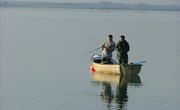Shakespeare manufactures a line of spinning reels for freshwater and saltwater fishing. The reels are popular for their durability and ease of use, since line tangles are minimized by the bail and open-face spool design that virtually elimates the backlash that can plague baitcasting reels. Seasoned anglers know the importance of spooling fresh line on their Shakespeare reels before the start of the season. Loading new line on a Shakespeare reel takes less than 15 minutes.
Items you will need
Shakespeare reel
Fishing rod matched to the reel
New line
Pocket knife or scissor
Pencil
Peel off the old line from the reel, clip the knot at the spool and discard the line responsibly. Don't leave fishing line in the field where wildlife could choke on it or become entrapped.
Attach the reel to the rod and secure with the lock nut on the lower end of the rod handle.
Thread the new line through the rod guides, starting at the tip, down to the reel.
Wrap the line several revolutions around the reel and tie it with a double overhand knot, clipping the excess with a scissor or pocket knife.
Insert a pencil through the hole in the new spool of line. The pencil serves as an axle for controlling the plastic spool while new line is added, preventing the spool from rolling away and causing a tangled mess. The pencil, when held by a friend, also keeps tension on the new line so it winds compactly on the reel, rather than in loose loops that can lead to snarls when casting.
Feed new line onto the Shakespeare reel using the retrieve handle. Turn at a steady pace to wind the line evenly along the spool.
Load the reel with line to the fill mark on the underside of the spool cover. The amount of line a Shakespeare reel can hold depends on the spool size and the weight of the line. More than twice as much 8-lb. fishing line can be added to a reel than 20-lb. line, for example.
Tie a snap swivel to the end of the line when finished, using a clinch knot to secure the swivel. Clip the open snap swivel to the rod tip until ready for fishing.
References
Writer Bio
James Clark began his career in 1985. He has written about electronics, appliance repair and outdoor topics for a variety of publications and websites. He has more than four years of experience in appliance and electrical repairs. Clark holds a bachelor's degree in political science.



